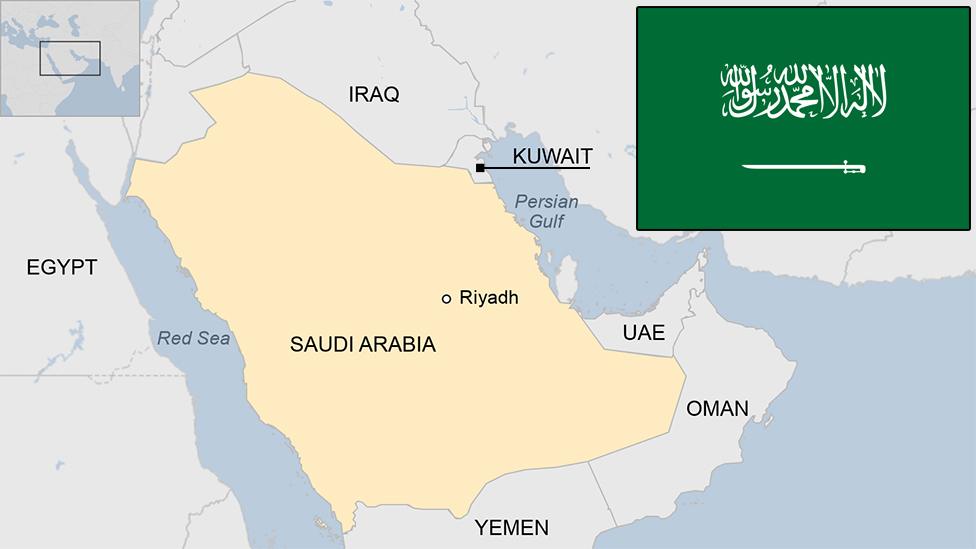Saudia Arabian film-maker breaks boundaries
- Published
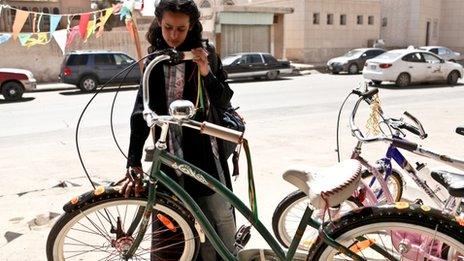
The film was first screened at the 2012 Venice Film Festival
It's a country without cinemas, and no infrastructure to support a film industry - but a young girl's dream to own and ride her own bicycle has become the first feature film ever to be written and directed by a Saudi Arabian woman.
Wadjda, by 38-year-old Haifaa Al Mansour, tells the tale of eleven-year-old Wadjda, a girl living in the Saudi capital Riyadh, who has her sights set on a green bike she sees in a shop window.
In a country where women are still legally forbidden to drive a car, even riding a bicycle is frowned upon, and so Wadjda must find the money to realise her dream by her own methods - from illegal activities such as selling mix tapes in the playground, to entering a Koran-reciting competition.
Al Mansour is married to an American, and now lives in the neighbouring Gulf state of Bahrain, but claims "it was very important for me to come back and tell a story of my home".
"I really wanted to set it in Saudi. I wanted women there to see something of their lives in this film.
"It's a place where telling a story is not always easy and there were lots of things to stop me. I had a lot of boundaries placed around me, but it is worth it.
"I just wanted to tell a simple story about girls, that still projected a deeper message about our society. There is always something fascinating about a character who won't give in."
'Trailblazer'
Whilst the director, who studied film in Australia, had made short features before, it took her five years to make Wadjda, mainly because, she says, "securing the funding and getting the filming permission to make a movie in Saudi Arabia was so hard."
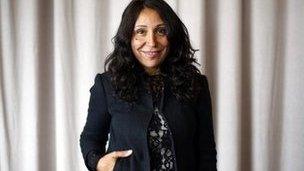
Al Mansour spent five years making the film
Eventually she was backed by Rotana, the TV production company owned by Saudi Prince Alwaleed Bin Talal, who is known as a supporter of women's rights.
Even then, Al Mansour adds, "when we shot in Riyadh, I could not publicly mix with my crew, who were men, so I often had to work from the back of a van, and talk to the actors on a walkie talkie, while I watched the scene on a monitor."
Wadjda, which stars a first-time actress, thirteen-year-old Waad Mohammed, has received multiple awards, including from the Venice International Film Festival where it first screened, but its maker says she had no intention of becoming a trailblazer, or a spokesperson for women's rights in Saudi Arabia.
"Being a Saudi woman, there are a lot of situations that I find difficult, but I don't want this to become a story because I am angry.
"I want to entertain people, and it's very important not to bring frustration into screenwriting, but for the public to feel that you simply want to talk to them, to tell them a story.
"I don't think confrontation works in this part of the world, they just don't respond to it. You have to change a society from within. Perhaps with the first draft of Wadjda, I was preaching too much and so I had to rip it up and start again.
"Yes, there are things that you want to say, but you say it through the characters - you give them life."
Al Mansour is one of twelve children, and says she discovered a passion for film from her father, the Saudi poet Abdul Mansour, who played her videos as a child.
Invisible
She acknowledges that such encouragement is not always forthcoming for other aspiring female directors within Saudi Arabia, where all women are legally obliged to have a male guardian, whatever their age.
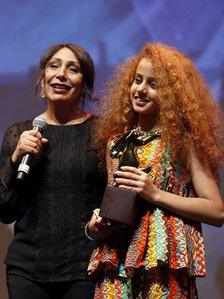
Novice actress Waad Mohammed (r) plays 11-year-Wadjda
"It is a huge struggle to be a female and a director here Societies in the Arab world can be vicious to women. They want them to conform and not break the rules.
In Saudi, we are very tribal, and too many women are afraid of what their family, their neighbours, and others in their tribe will think of them. They need a lot of encouragement, to learn to trust themselves, and not to be afraid."
"However, politically and socially, all the conditions are coming together in this region to make it one of the most exciting places in the world to be a filmmaker, and to make movies that the rest of the world will want to see.
"I feel so honoured, honestly, to be putting a human face on my culture. Too many women are invisible here, and I hope, in a small way, I can inspire other Saudi women to break away from the ordinary and to find success."
In 2009, the World Economic Forum ranked Saudi Arabia 130th out of 134 countries when it came to parity on gender issues, but Al Mansour believes the situation is changing, highlighting the case of 19-year-old Sarah Attar, who at the 2012 London Olympics became the first ever Saudi woman to compete in track and field events.
"You know, people will have seen that girl compete, and think, 'I know who she is, I know her parents. If they let her compete, why not me as well?'"
While she admits she has received hate mail for making the film - which accuses her of 'not being religious' - Al Mansour believes many in Saudi Arabia will be watching the movie.
"Even though it can't have a cinema release, it will be shown on TV and on DVD. I screened it for my sisters and their daughters. They were amazed to see themselves and their schools, and I felt for the first time, they had an intimate portrayal of their culture. It was very touching."
Wadjda is released in the UK on 19 July 2013.
- Published11 March 2013
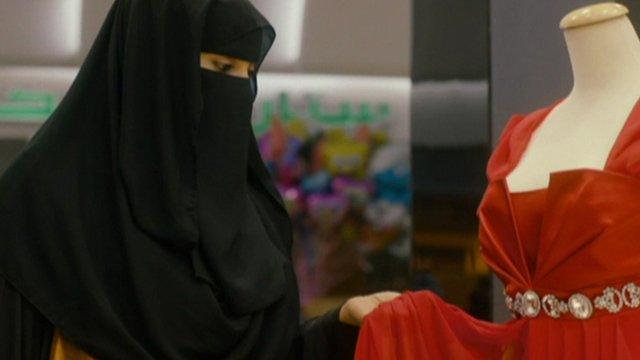
- Published29 August 2023
